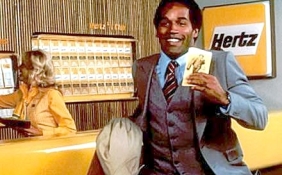The National Enquirer recently ran with a story claiming that golf pro and swordsman extraordinaire Tiger Woods snuck into his ex-wife Elin’s Florida home over Christmas and rummaged through her personal diaries. Mind you, this is from the Enquirer, but they did get that whole John Edwards’ love child story before anyone else, so… True or not, it could cause Nike – Tiger’s remaining premium product sponsor – to ponder severing its business ties with the troubled golfer.
 Of course, the results of a new advertising study may have already convinced Nike to set Tiger free. Woods is identified in an Ace Metrix (AM) study of TV advertising effectiveness as the ‘worst celebrity endorsement” of 2010. After examining more than 2600 TV ads in 2010, AM found that the scandal-plagued Woods had ‘lifted’ (how much better or worse an ad did compared with industry competition) the value of an ad campaign by minus 30%.
Of course, the results of a new advertising study may have already convinced Nike to set Tiger free. Woods is identified in an Ace Metrix (AM) study of TV advertising effectiveness as the ‘worst celebrity endorsement” of 2010. After examining more than 2600 TV ads in 2010, AM found that the scandal-plagued Woods had ‘lifted’ (how much better or worse an ad did compared with industry competition) the value of an ad campaign by minus 30%.
On average, ads featuring a celebrity scored 9 points lower than ads without celebrities, and almost a fifth of celebrity ads yielded negative lift scores in excess of 10%. AM’s conclusion? Celebrity endorsements do not perform any better than non-celebrity ads, and in some cases they perform much worse.
Would have been interesting if the AM folks had put online poker ads under their microscope. The past month has seen a flurry of activity on the poker pro endorsement front – Annie Duke, Phil Hellmuth, Prahlad Friedman, Jonathan Duhamel, Viktor Blom… Ace Metrix has yet to weigh in on whether the online poker industry’s fetish for pro players is helping or hurting its marketing efforts. But away from the cameras, when it comes to the industry’s fixation on the needs of its sharper players at the expense of its casual players, an unsustainable business model emerges.
It’s bad enough when poker companies offer their better players additional financial incentives such as rakeback. But to also tailor their software (multi-tabling, not blocking hand histories, etc.) to cater to the needs of sharks is insanity. To employ the popular metaphor, imagine there’s a lagoon, and in this lagoon there are sharks and there are fish. Sharks eat fish. Online poker companies discovered the lagoon, studied its ecosystem a while, decided there was an imbalance, so they gave the sharks chainsaws. (Worst marine biologists ever…)
Fish may not spend a lot of time hanging out in 2+2 Forums, but fish do talk to their friends, relatives and co-workers. Eventually, after enduring one too many online poker feeding frenzy, they start talking about how quickly their experience was over and how little enjoyment it provided. They go on to say that they’re now planning to spend their entertainment dollars on something that might provide a little more value and a lot more fun. And the people listening, many of whom may never have tried online poker before, will decide it’s not worth trying.
Of all channels, H2 Gambling Capital identified poker as growing the slowest in 2010 — and without the novelty of the new French and Italian markets, growth would have been negative. Growth is expected to slow even further in 2011. For the record, the year is only two weeks old and we’ve already seen two poker rooms fold. Something needs to change.
